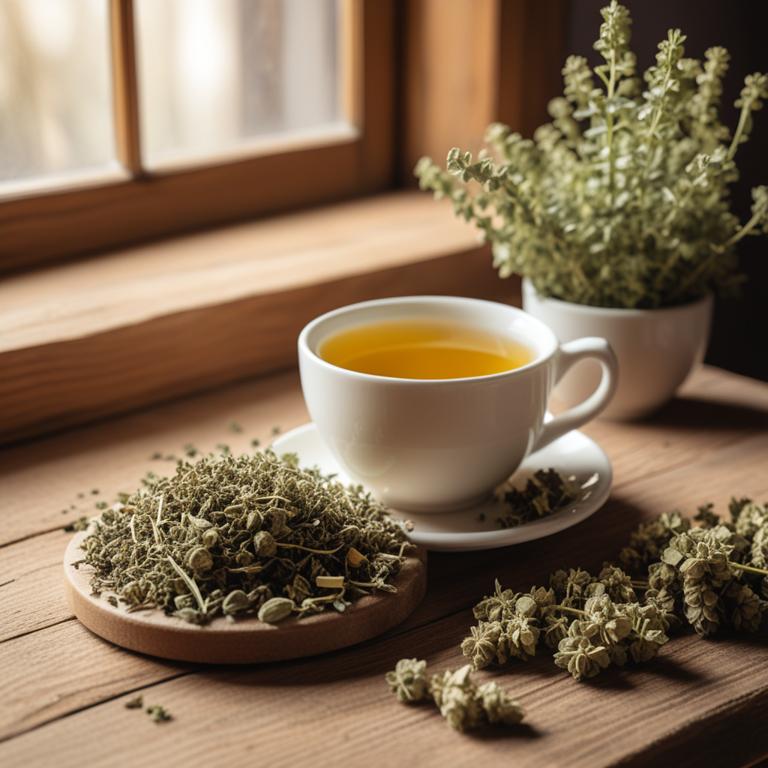11 Best Herbal Teas For Foot Odor

Herbal teas for foot odor are a natural remedy used to alleviate the unpleasant smell caused by excessive sweating, fungal infections, or poor hygiene in the feet.
These teas are often infused with herbs that possess antimicrobial, antifungal, and antibacterial properties, which help to combat the underlying causes of foot odor.
Examples of herbal teas that can be used to treat foot odor include peppermint tea, which cools the skin and reduces sweat, chamomile tea, which soothes and calms the skin, lemongrass tea, which has antifungal properties, and tea tree oil tea, which has antibacterial properties that can help to eliminate fungal infections.
Other herbal teas that can be used to treat foot odor include lavender tea, which has antiseptic properties, eucalyptus tea, which helps to reduce sweat and cool the skin, and sage tea, which has antimicrobial properties that can help to eliminate bacteria and fungi.
According to "Die Pharmazie", teas for foot odor may benefit from ingredients containing manuka oil, which demonstrated a higher antibacterial activity against gram-positive bacteria than Australian tea tree oil.
Below there's a list of the 11 best herbal teas for foot odor.
- 1. Eucalyptus globulus teas
- 2. Achillea millefolium teas
- 3. Melaleuca alternifolia teas
- 4. Thymus serpyllum teas
- 5. Mentha x piperita teas
- 6. Lavandula angustifolia teas
- 7. Curcuma longa teas
- 8. Rosmarinus officinalis teas
- 9. Origanum vulgare teas
- 10. Cymbopogon citratus teas
- 11. Cinnamomum verum teas
Also you may be interested in...
TODAY'S FREE BOUNDLE
Herb Drying Checklist + Herbal Tea Shopping List + Medicinal Herbs Flashcards
Enter you best email address below to receive this bundle (3 product valued $19.95) for FREE + exclusive access to The Aphotecary Letter.
$19.95 -> $0.00
1. Eucalyptus globulus teas

Eucalyptus globulus teas have been traditionally used to treat foot odor, a common ailment characterized by unpleasant foot smell due to excessive sweat and bacteria growth.
The antimicrobial properties of Eucalyptus globulus teas help to combat bacteria that cause foot odor, thereby reducing its severity.
The bioactive constituents, including eucalyptol, limonene, and alpha-pinene, in Eucalyptus globulus teas inhibit the growth of bacteria and fungi that contribute to foot odor, making it an effective treatment option.
By using Eucalyptus globulus teas, individuals can experience relief from foot odor and enjoy the benefits of improved foot hygiene and reduced bacterial growth.
2. Achillea millefolium teas

Achillea millefolium teas, also known as yarrow tea, have been traditionally used to treat foot odor due to their antifungal and antibacterial properties.
The herbal preparation helps to treat this ailment by inhibiting the growth of fungi and bacteria that cause foot odor, promoting a healthy balance of the skin's microbial flora.
The bioactive constituents of yarrow tea, including sesquiterpenes, flavonoids, and phenolic acids, contribute to its antifungal and antibacterial properties, making it an effective remedy for foot odor.
The benefits of using Achillea millefolium teas to treat foot odor include reduced fungal and bacterial growth, improved skin health, and a refreshing, deodorizing effect that leaves the feet feeling clean and odor-free.
3. Melaleuca alternifolia teas

Melaleuca alternifolia teas, also known as tea tree oil, have been traditionally used to treat foot odor due to their antimicrobial and antifungal properties.
The bioactive constituents, such as terpinen-4-ol and cineole, in this herbal preparation help to combat the bacteria and fungi that cause foot odor, providing relief and freshness to the feet.
This herbal preparation works by inhibiting the growth of odor-causing microorganisms and reducing the production of volatile sulfur compounds, ultimately eliminating the unpleasant smell from the feet.
The benefits of using Melaleuca alternifolia teas to treat foot odor include a reduction in sweat and odor, improved foot hygiene, and a refreshing, soothing sensation on the skin.
4. Thymus serpyllum teas

Thymus serpyllum teas have been traditionally used to treat foot odor, a common issue caused by the growth of bacteria and fungi on the skin.
The antiseptic and antimicrobial properties of Thymus serpyllum, particularly its essential oils, help to inhibit the growth of these microorganisms, thereby reducing the odor-causing compounds.
The bioactive constituents, including thymol and carvacrol, in Thymus serpyllum teas contribute to its antifungal and antibacterial effects, making it an effective herbal preparation for treating foot odor.
Regular consumption of Thymus serpyllum teas can help to prevent the recurrence of foot odor, promoting a fresher and healthier foot environment.
5. Mentha x piperita teas

Mentha x piperita teas, also known as peppermint tea, have been traditionally used to treat foot odor due to its antimicrobial and antifungal properties, which help to inhibit the growth of bacteria and fungi that cause this ailment.
The bioactive constituents, including menthone, menthol, and limonene, in peppermint tea contribute to its effectiveness in treating foot odor by reducing inflammation and promoting a healthy microbial balance.
By consuming peppermint tea, individuals can help to reduce sweat and eliminate the bacteria that thrive in warm, moist environments, ultimately alleviating foot odor symptoms.
The benefits of using peppermint tea to treat foot odor include its natural, non-invasive, and cost-effective approach, making it an attractive alternative to conventional treatments.
6. Lavandula angustifolia teas

Lavandula angustifolia teas have been traditionally used to treat foot odor, a common issue caused by sweat and bacteria buildup.
The antifungal and antibacterial properties of this herbal preparation help to combat the growth of odor-causing microorganisms, thereby reducing foot odor.
The bioactive constituents, including linalool and linalyl acetate, contribute to its antimicrobial properties, which aid in the treatment of foot odor.
Regular consumption of Lavandula angustifolia teas can also help to reduce sweat production, making it an effective and natural remedy for foot odor.
7. Curcuma longa teas

Curcuma longa teas, derived from the turmeric plant, have been traditionally used to treat foot odor due to their potent antimicrobial and antifungal properties.
The bioactive constituents, including curcumin and polyphenols, in these teas help to inhibit the growth of odor-causing bacteria and fungi, thereby reducing foot odor.
The antimicrobial properties of Curcuma longa teas help to kill the bacteria that cause foot odor, while their anti-inflammatory properties soothe and calm the skin, promoting a healthy environment for the feet.
The benefits of using Curcuma longa teas to treat foot odor include a reduction in foot odor, improved foot hygiene, and the prevention of further infections, making it a natural and effective remedy for this common ailment.
8. Rosmarinus officinalis teas

Rosmarinus officinalis teas, also known as rosemary tea, have been traditionally used to treat foot odor due to their antimicrobial and antifungal properties.
The bioactive constituents of rosemary tea, including carnosic acid and rosmarinic acid, help to inhibit the growth of odor-causing bacteria and fungi, thereby reducing foot odor.
The antiseptic properties of rosemary tea also help to soothe and deodorize the feet, leaving them feeling fresh and clean.
By incorporating rosemary tea into one's foot care routine, individuals can enjoy the benefits of reduced foot odor and improved overall foot health.
9. Origanum vulgare teas

Origanum vulgare teas, also known as wild marjoram or oregano tea, have been traditionally used to treat foot odor, a condition caused by the presence of bacteria that thrive in warm, moist environments.
The antimicrobial properties of Origanum vulgare, particularly the presence of carvacrol and thymol, help to inhibit the growth of bacteria, thereby reducing foot odor.
These bioactive constituents work synergistically to combat the root cause of the condition, providing relief from the unpleasant symptoms associated with foot odor.
Regular consumption of Origanum vulgare tea has been found to be beneficial in treating foot odor, thanks to its ability to balance the pH of the skin and reduce the bacterial load, thereby promoting a healthy and odor-free environment.
Related Study
According to "BioMed research international", Origanum vulgare teas may be effective in reducing foot odor due to its antimicrobial properties, which have been shown to inhibit the growth of drug-resistant bacterial isolates, including those that cause foot infections.
10. Cymbopogon citratus teas

Cymbopogon citratus teas, also known as lemongrass tea, have been traditionally used to treat foot odor due to its antimicrobial and antifungal properties.
The bioactive constituents such as citral, geraniol, and limonene present in lemongrass tea help to inhibit the growth of bacteria and fungi that cause foot odor.
By drinking lemongrass tea, individuals can reap the benefits of its antiseptic properties, which help to eliminate the bacteria and fungi that cause foot odor, thereby reducing the unpleasant smell and promoting a healthy foot environment.
Regular consumption of lemongrass tea may also help to reduce inflammation and promote a sense of well-being, making it a natural and holistic approach to treating foot odor.
11. Cinnamomum verum teas

Cinnamomum verum teas are a popular herbal remedy for treating foot odor, a condition caused by the growth of bacteria and fungi on the skin.
The antifungal and antibacterial properties of Cinnamomum verum teas help to inhibit the growth of these microorganisms, thereby reducing the occurrence of foot odor.
The bioactive constituents present in Cinnamomum verum teas, such as cinnamaldehyde and eugenol, have been found to exhibit potent antimicrobial activity, which contributes to their efficacy in treating foot odor.
Regular use of Cinnamomum verum teas has been shown to provide long-term relief from foot odor, promoting a healthy and odor-free foot environment.
Related Study
According to "Fitoterapia", Cinnamomum verum teas for foot odor may be effective due to the essential oil's broad antibacterial activity against pathogenic bacteria, as it exhibited the highest and broadest antibacterial activity among the tested oils.